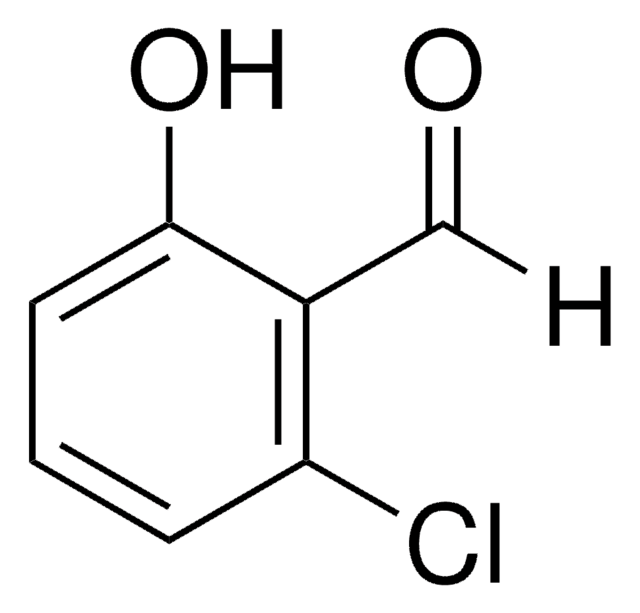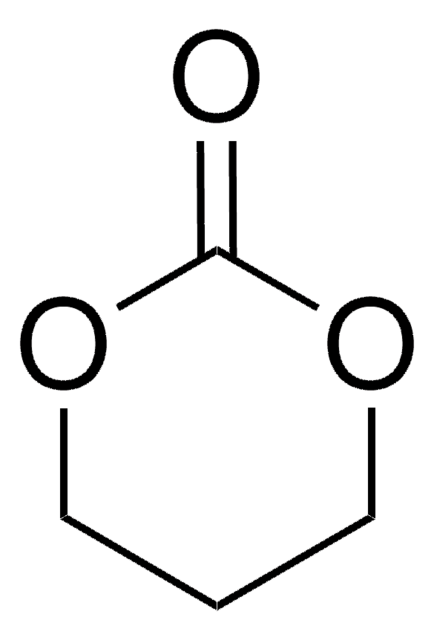All Photos(1)
About This Item
Empirical Formula (Hill Notation):
C4H4O4
CAS Number:
Molecular Weight:
116.07
EC Number:
MDL number:
UNSPSC Code:
12162002
PubChem Substance ID:
NACRES:
NA.23
Recommended Products
Assay
≥99%
mp
82-86 °C (lit.)
shipped in
dry ice
storage temp.
−20°C
SMILES string
O=C1COC(=O)CO1
InChI
1S/C4H4O4/c5-3-1-7-4(6)2-8-3/h1-2H2
InChI key
RKDVKSZUMVYZHH-UHFFFAOYSA-N
Looking for similar products? Visit Product Comparison Guide
Related Categories
General description
Glycolide is a cyclic dimer of α-hydroxy acid that can be used in the formation of aliphatic polyester. It is synthesized by the dimerization of glycolic acid. It forms a low toxic synthetic biodegradable polymer that can be used in medical applications. It is majorly used in the formation of a highly crystalline poly(glycolide) by ring opening polymerization.
Application
Glycolide can be used as a monomer in the preparation of poly(lactic-co-glycolide)(PGLA) via copolymerization with lactide monomer. PGLA is further used in the following applications:
- Porous PGLA microsphere scaffolds are used in bone repair applications.
- Encapsulated PGLA nanoparticles can be used in drug delivery and tissue engineering applications. Polymeric micro/nanoparticles made from PLGA have gained significant interest for their appealing characteristics, including biodegradability, biocompatibility, prolonged drug release, and safeguarding the drug against degradation.
Signal Word
Warning
Hazard Statements
Precautionary Statements
Hazard Classifications
Acute Tox. 4 Oral - Eye Irrit. 2
Storage Class Code
11 - Combustible Solids
WGK
WGK 3
Flash Point(F)
Not applicable
Flash Point(C)
Not applicable
Personal Protective Equipment
dust mask type N95 (US), Eyeshields, Gloves
Certificates of Analysis (COA)
Search for Certificates of Analysis (COA) by entering the products Lot/Batch Number. Lot and Batch Numbers can be found on a product’s label following the words ‘Lot’ or ‘Batch’.
Already Own This Product?
Find documentation for the products that you have recently purchased in the Document Library.
Customers Also Viewed
Types of biodegradable polymers
Introduction of Bioplastic Engineering, 81-151 (2016)
Hendrik Vögeling et al.
Materials science & engineering. C, Materials for biological applications, 103, 109749-109749 (2019-07-28)
Catheter related infections are causing one third of all blood stream infections. The mortality of those infections is very high and the gold standard for catheter related blood stream infections (CR-BSI) is still the removal of the catheter and systemic
Habibun Nabi et al.
Parasitology research, 116(1), 359-370 (2016-10-28)
Toxoplasmosis is one of the most common zoonotic protozoal diseases. Recent advances in biotechnology have produced recombinant protein, which are immunogenic, and progress in nano-pharmaceutics has generated encapsulated protein in nanospheres, which are suitable for vaccine delivery. DNA was extracted
Meital Ben David-Naim et al.
Biomaterials, 145, 154-167 (2017-09-02)
siRNA-loaded nanoparticles (NPs) administered systemically can overcome the poor stability and rapid elimination of free double-stranded RNA in circulation, resulting in increased tumor accumulation and efficacy. siRNA against osteopontin (siOPN), a protein involved in breast cancer development, was encapsulated in
J L Guo et al.
Science advances, 5(6), eaaw7396-eaaw7396 (2019-06-12)
Synthetic hydrogels are investigated extensively in tissue engineering for their tunable physicochemical properties but are bioinert and lack the tissue-specific cues to produce appropriate biological responses. To introduce tissue-specific biochemical cues to these hydrogels, we have developed a modular hydrogel
Our team of scientists has experience in all areas of research including Life Science, Material Science, Chemical Synthesis, Chromatography, Analytical and many others.
Contact Technical Service













